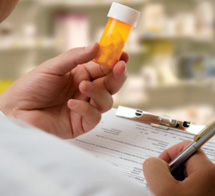Medication Errors
 Let’s say a physician writes a prescription for Colchicine and accidentally orders “10.0 mg,” when he should have ordered “1.0 mg.” That’s a tiny decimal error, a mistake even the best doctor could make. But it can be catastrophic for the patient. The higher dose could cause Colchicine poisoning, similar to arsenic poisoning: burning in the mouth and throat, excruciating abdominal pain. Internal organs would melt away and death would likely occur within 24 to 72 hours.
Let’s say a physician writes a prescription for Colchicine and accidentally orders “10.0 mg,” when he should have ordered “1.0 mg.” That’s a tiny decimal error, a mistake even the best doctor could make. But it can be catastrophic for the patient. The higher dose could cause Colchicine poisoning, similar to arsenic poisoning: burning in the mouth and throat, excruciating abdominal pain. Internal organs would melt away and death would likely occur within 24 to 72 hours.
The ease with which even the best doctors can make gruesome errors is why hospitals set up elaborate systems to check and double check orders before drugs are given to patients. Some hospitals are better at this checking than others. Medication errors happen all the time, an estimated one million each year, contributing to 7,000 deaths. On average there is one medication error every day for every inpatient.


“Medication errors happen all the time, an estimated one million each year, contributing to 7,000 deaths. On average there is one medication error every day for every inpatient.”
Wow. This is sobering.
And this is even with the double-checking system. I realize that mistakes will happen, but it seems like there could be a computer program (at the pharmacy perhaps?) that would automatically check for errors. If something seems unusual, it would flag it.
Looks like they are working on just that:
“According to recent research, the best known way for hospitals to protect patients from errors is by adopting technology called computerized physician order entry (CPOE). The physician (or other authorized prescriber) enters orders for a patient on a computer that contains patient information such as key lab values, clinical condition, allergies, etc. The computer checks the safety and appropriateness of the order and sends it electronically to the pharmacy.”
“The research suggests errors decline by as much as 85 percent when hospitals implement CPOE, yet the pace of adoption in the hospital industry is agonizingly slow. To jump start progress, the federal government used economic stimulus funds starting back in 2009 to incentivize hospital investment in CPOE and electronic medical records (EMRs).”
It is hard to correctly identify the incentive structure in a discombobulated market like health care, but either these systems have problems or government intervention in the market has made it difficult for health care providers to utilize these great technologies.
Here you go:
“The fact that hospitals can usually pass the cost of errors to purchasers is precisely the reason adoption of CPOE stalls. Hospitals are much speedier and technologically savvy when their profits are threatened.”
Exactly. A real market would see hospitals’ profits threatened. We don’t have a real market.
“Next it is up to us — as citizens, patients and payers — to focus our attention and our market power on those hospitals, the ones that put their patients’ health and well-being first.”
This is also part of the problem. Since most of us aren’t directly effected by health care changes, we don’t respond like we do in normal markets. Employer-provided, government-provided, or any other third party system will end in failure.
It really is amazing. The areas we give the most attention (probably health care and education) suffer from the same problems.
That would be a terrible way to die. I’m going to be more conscious of my medicinal intake from now on.
I would like to see individual error rates advertised. Let’s get some real competition in here.
Between the colchicine poisoning and the 1,000,000 medication errors every year, I hope there are not any hypochondriacs reading this post!